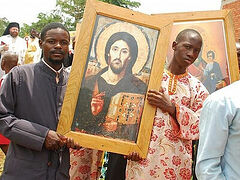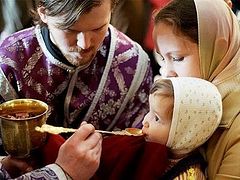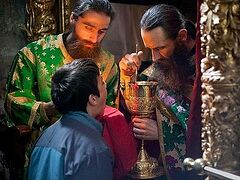Helsinki, Finland, October 27, 2021
The Bishops’ Council of the Finnish Orthodox Church (Patriarchate of Constantinople) met on October 13 in Helsinki under the chairmanship of Archbishop Leo of Helsinki and All Finland, discussing, among other things, the issue of people who suffer from celiac disease receiving Holy Communion.
The hierarchs previously discussed the matter in February, and instructed Fr. John Lampropoulos to study the stance and practice of the Church of Greece.
“Those who suffer from celiac disease cannot commune of the Body of Christ at the Eucharist due to their intolerance to wheat protein. Those who suffer from an acute form cannot commune of the Blood of Christ either, because it could also contain particles of wheat flour,” the Finnish Church wrote in its February report.
In his presentation at the session earlier this month, Archbishop Leo reported that having studied the issue, Fr. John reported back that the Greek Church has no developed position on the matter. The bioethicist Metropolitan Nikolaos of Mesogaia and Lavreotiki told him that it is a canonical issue and that it requires an appeal to the Canonical Department of the Holy Synod of the Patriarchate of Constantinople.
Thus, Abp. Leo will appeal to Constantinople for a resolution to the matter.
As OrthoChristian previously reported, at least one hierarch of Constantinople has addressed the matter before.
On May 1, 2018, Metropolitan Isaiah of Denver of the Greek Archdiocese of America (Patriarchate of Constantinople) issued an encyclical to his priests and parishioners after hearing of a number of cases where people approached the chalice and asked to be communed only of the Blood of Christ, believing that the Body would harm them.
He responded:
If there are Orthodox Christians in our parishes who believe that, after the Holy Spirit consecrates the Bread and the Wine during the Divine Liturgy, the gifts are still bread and wine, they should never again receive the divine Body and Blood again, until they believe that the holy sacrament of our Lord Himself is His spiritual presence, that is, both His Body and His Blood.
… And, if the doctor's instructions to them about not eating the Body (bread) because of the doctor's medical knowledge are considered more important than the Holy Eucharist, then they should not receive the Holy Eucharist of the Lord, unless or until they believe that the Creator of all has more knowledge regarding eternal life than all the medical science of this fallen world.
Follow us on Facebook, Twitter, Vkontakte, Telegram, WhatsApp, MeWe, and Gab!





